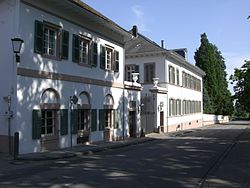Winery Dr. Bürklin-Wolf
| Winery Dr. Bürklin-Wolf | ||
|---|---|---|
 The manor house of the winery on the Weinstrasse |
||
| Data | ||
| place | Wachenheim on the Wine Route | |
| Builder | Families Bürklin and Wolf | |
| Architectural style | historicizing hipped roof building | |
| Construction year | 1844 | |
| Coordinates | 49 ° 26 '24 " N , 8 ° 10' 49" E | |
|
|
||
The Dr. Bürklin-Wolf is one of the largest wineries and the largest self-marketing winery in Wachenheim an der Weinstrasse in the Palatinate wine-growing region . The winery produces predominantly white wines, predominantly Riesling , on 85 hectares . Bürklin-Wolf relies heavily on terroir , carries out its own site classification (around 28 hectares classified) and is a member of the Association of German Predicate and Quality Wineries .
Sites and grape varieties
The winery mainly produces Riesling and is best known for it. To a lesser extent, u. a. white and red Burgundy wines are produced.
The winery has a number of prime locations, especially west of the Wine Route in the area of:
with the locations : Altenburg , Gerümpel , Goldbächel , Kirchenstück , Jesuitengarten , Ungeheuer , Pechstein , Hohenmorgen , Gaisböhl , Kalkofen .
In this area, the vines benefit from basalt deposits in the soil, which store the sun's heat well and thus offer a growth advantage . The basalt deposits come from the Forster Pechsteinkopf .
history
The winery can be traced back to 1597. Bernhard Bürklin is the founder of the winery. The winery was of outstanding importance from around 1875, when Albert Bürklin married Luise Wolf from Wachenheim and the winery was given its current name. Foundations and charities in favor of the city of Wachenheim also date from this time, such as B. the donation of the citizen hospital. Albert Bürklin was a member of the Reichstag (1877), vice-president of the Reichstag (1893) and general director of the court theater in Karlsruhe. The cultural creation still has an effect today, in the form of cultural events in the Bürklin house, such as the summer opera in the English garden of the property.
The great-nephew of the same name, Albert Bürklin , continued the business for much of the 20th century and was heavily involved in the Palatinate Farmers' Association . In 1967 the award took place in the form of the great Federal Cross of Merit of the Federal Republic of Germany .
Bettina Bürklin-von Guradze has been running the winery since 1990. Steffen Brahner has been the managing director since 2008.
Terroir
The winery is increasingly focusing on nature and uses horses for gentle tillage in one location. The winery largely dispenses with synthetic sprays or mineral fertilizers. It is fertilized with manure or compost . Pheromone traps are increasingly used against pest infestation . In 2005 the entire cultivation area was converted to biodynamic viticulture. As the first foreign winery, Dr. Bürklin-Wolf was accepted into the French association of biodynamic winemakers Biodyvin .
Web links
- Winery Dr. Bürklin-Wolf. Retrieved November 22, 2016 .
- Biodyvin. Syndicat international des vignerons en culture bio-dynamique. Retrieved November 22, 2016 (French).
- Dr. Bürklin-Wolf. In: Vintner profile. VDP , accessed November 22, 2016 .
